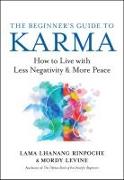The Beginner's Guide to Karma
BücherAngebote / Angebote:
Two practitioners of Tibetan Buddhism unravel the complexities of karma, an idea widely known but little understood in the modern WestWestern science has discovered that the physical world operates according to universal laws of nature, such as the law of gravity and the laws of motion. Twenty-six centuries ago, the Buddha fleshed out the universal law of the spiritual realm: karma. The law of karma holds that our actions, our words, and even our thoughts inevitably produce effects that return to us in some form — in this lifetime or a future one. Today, most Westerners have a passing familiarity with the concept of karma, which amounts to “what goes around, comes around.” This is true as far as it goes, but it merely scratches the surface of a complex and fascinating topic.In The Beginner’s Guide to Karma, Lama Lhanang Rinpoche and Mordy Levine encourage readers to forget what they’ve heard about karma and look at the subject afresh. Delving into Buddhist scripture and tradition, the authors give a comprehensive outline of karma that incorporates psychology, ethics, and metaphysics. Using everyday language and real-life examples, they clear away myths, illustrate how karma works in daily life, and offer daily practices to build positive karma. In the process, they resolve intriguing philosophical questions, such as:• Is karma compatible with free will?• Where is karma stored, and where does it go when we die?• Can negative karma ever be fully extinguished?• Is there such a thing as collective karma that affects entire groups of people?• Is the idea of karma still meaningful if we don’t believe in reincarnation?In providing the answers, The Beginner’s Guide to Karma neatly sums up the Buddhist worldview and makes a compelling case for Buddhism as a way of life that nurtures compassion, joy, and inner peace in an uncertain world.
Erscheint im November
